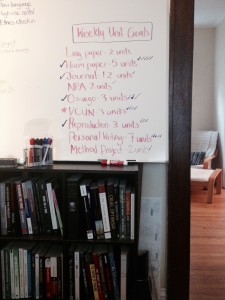In the 2002 rom-com About a Boy, Hugh Grant plays a well to do bachelor who lives off the royalties of a song his deceased father produced. With no need to work, Will Freeman (Grant) spends most of his time engaged in leisure pursuits: taking bubble baths, playing pool, getting scalp massages and looking for attractive women to rendezvous with. I can relate to the character. Not so much that I spend most of my time taking bubble baths and looking for attractive women (I do this only in moderation) but in that I live alone and have a flexible schedule. Like Freeman (Grant) I feel I need to impose order on my time. There is a scene early on the film where Freeman narrates his “units of time” theory.
“I find the key is to think of a day as units of time, each unit consisting of no more than thirty minutes. Full hours can be a little bit intimidating and most activities take about half an hour. Taking a bath: one unit, watching countdown: one unit, web-based research: two units, exercising: three units, having my hair carefully disheveled: four units. It’s amazing how the day fills up, and I often wonder, to be absolutely honest, if I’d ever have time for a job; how do people cram them in?”
There is an academic version of the units of time theory. For struggling writers, the advice is to commit to a nominal unit of daily writing (usually 45 minutes). The idea is that the large project is daunting and seeing it in small units helps get things under way and helps you to see realistically what can be accomplished. It is supposed to prevent ‘binge’ style writing that has been shown to be ineffective for producing consistent work over the long-term. This theory is part of many of the writing self-help books I have read (in lieu of writing) over the years. Books like: How to Write Your Dissertation in 15 Minutes a Day, Writing Your Journal Article in Twelve Weeks: A Guide to Academic Publishing Success, and a personal favourite Professors as Writers: A self-Help Guide to Productive Writing. Many of these have been reviewed on Savage Minds. In most of these types of books they encourage to take a serious look at how you spend your time (oh, hi Tumblr and Savage Minds!). The point they try to make is that very few academics have “absolutely no time for writing” rather it is easy for it to get de-prioritized (it is VERY easy to argue with this especially for the many precariously employed teaching faculty out there).
When the teaching term is over and I am free to organize my time as I see fit, my protestant fears that I don’t work hard enough really dial-up. Here is where the units help. I decide on Sunday nights what has to be done in the week and assign units to different projects. This helps me make time to things I do not want to and limit the things I get carried away with (household reproduction). Sometimes I go over on tasks and don’t get to others. This helps me see what I am unrealistic about time-wise (anything that involves university bureaucracy or Canada). A post this week on the Chronicle’s Vitae makes the case for realistic summer writing schedules. I find myself needing to re-read these types of messages as I set rather lofty goals almost daily.
 Organizing your own time for/at work is a privilege many people don’t have. It is part of why I am professoring despite the erosion of proper conditions of work and compensation. That said, I often feel uneasy about my time. Did I do as much as I could? Should I take Saturday off? How many times a day on Tumblr is too many? But isn’t Tumblr ‘work’ if most of your buds are anthropologists on there? I spend one (ok, 2 units) on organization each week. Do I need to better organize my organization time? Is there a book on organizing your organizing? Oh, the agony!
Organizing your own time for/at work is a privilege many people don’t have. It is part of why I am professoring despite the erosion of proper conditions of work and compensation. That said, I often feel uneasy about my time. Did I do as much as I could? Should I take Saturday off? How many times a day on Tumblr is too many? But isn’t Tumblr ‘work’ if most of your buds are anthropologists on there? I spend one (ok, 2 units) on organization each week. Do I need to better organize my organization time? Is there a book on organizing your organizing? Oh, the agony!
What about you summer writers? What shape does your practice take? Do these systems support or daunt you?
*Checks off one unit of 700 words for today despite a slow start*